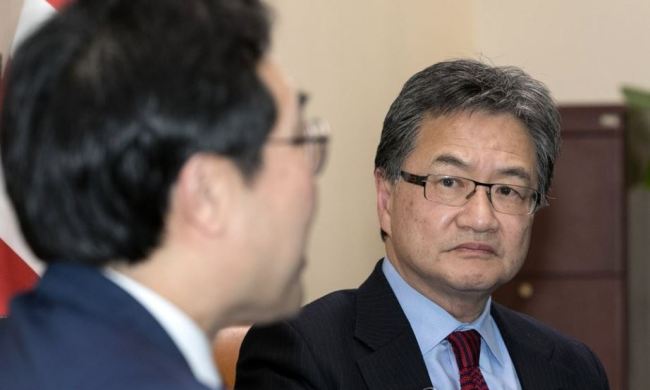Ex-US envoy cautions against signing peace treaty with N. Korea
By YonhapPublished : May 8, 2018 - 09:32
WASHINGTON -- A former top US diplomat for North Korea policy cautioned Monday against signing a peace treaty with North Korea before it completely dismantles its nuclear weapons program.
Joseph Yun, former US special representative for North Korea policy, said the move would grant the regime the legitimacy it seeks as a nuclear weapons state.
"For me, it would be a real mistake to have a peace treaty come first, then denuclearization, because that is clearly an open admission that you're dealing with North Korea as an acknowledged nuclear weapons state," Yun told a forum hosted by the Center for Strategic and International Studies think tank.
Joseph Yun, former US special representative for North Korea policy, said the move would grant the regime the legitimacy it seeks as a nuclear weapons state.
"For me, it would be a real mistake to have a peace treaty come first, then denuclearization, because that is clearly an open admission that you're dealing with North Korea as an acknowledged nuclear weapons state," Yun told a forum hosted by the Center for Strategic and International Studies think tank.

North Korean leader Kim Jong-un has expressed a commitment to denuclearizing the Korean Peninsula. In talks with South Korean President Moon Jae-in last month, the two leaders reaffirmed the goal of a nuclear-free peninsula through "complete denuclearization" and agreed to work this year for a peace treaty to formally end the 1950-53 Korean War.
Yun, who retired from the State Department in March, said the road to a peace treaty will be "very complicated" and take much longer than two years. It will also require the involvement of China, a signatory to the Armistice Agreement that ended the war, along with North Korea and the US.
"I think to me, strategically, one of the key reasons why Kim Jong-un is doing this is because China has prioritized denuclearization higher than before and has prioritized instability, the likelihood of instability, higher than before," the former diplomat said. "You saw that very clearly in China joining in a number of, or in fact virtually all, UN Security Council resolutions. So I think that's where the pressure has come from."
Last year the UN Security Council unanimously adopted sanctions resolutions in response to North Korea's tests of a nuclear weapon and intercontinental ballistic missiles apparently capable of striking the US mainland.
China, North Korea's key ally and trading partner, backed those resolutions.
Yun also said the advancements in North Korea's nuclear and ballistic missile programs have made the conditions for denuclearization tougher.
"We have to admit the price has gone up and we are not going to be able to buy them off at the price we did either (at the) six-party talks or Agreed Framework," he said, referring to the North's past agreements to freeze its nuclear program in exchange for economic aid. Those deals ultimately collapsed. "In that sense, you are going to need many summits and many meetings just to get to what they want. And you have to address what they want. If you believe they should only address what we want I think that's a very, very mistaken path."
US President Donald Trump and Kim are expected to meet in the coming weeks to discuss concrete steps to dismantle the nuclear program.
If the meeting takes place inside the Demilitarized Zone dividing the Koreas -- an idea Trump has floated -- a trilateral meeting involving Moon will be sure to follow, Yun said.(Yonhap)







![[Graphic News] More Koreans say they plan long-distance trips this year](http://res.heraldm.com/phpwas/restmb_idxmake.php?idx=644&simg=/content/image/2024/04/17/20240417050828_0.gif&u=)
![[KH Explains] Hyundai's full hybrid edge to pay off amid slow transition to pure EVs](http://res.heraldm.com/phpwas/restmb_idxmake.php?idx=644&simg=/content/image/2024/04/18/20240418050645_0.jpg&u=20240419100350)








![[KH Explains] Hyundai's full hybrid edge to pay off amid slow transition to pure EVs](http://res.heraldm.com/phpwas/restmb_idxmake.php?idx=652&simg=/content/image/2024/04/18/20240418050645_0.jpg&u=20240419100350)

![[Today’s K-pop] Illit drops debut single remix](http://res.heraldm.com/phpwas/restmb_idxmake.php?idx=642&simg=/content/image/2024/04/19/20240419050612_0.jpg&u=)